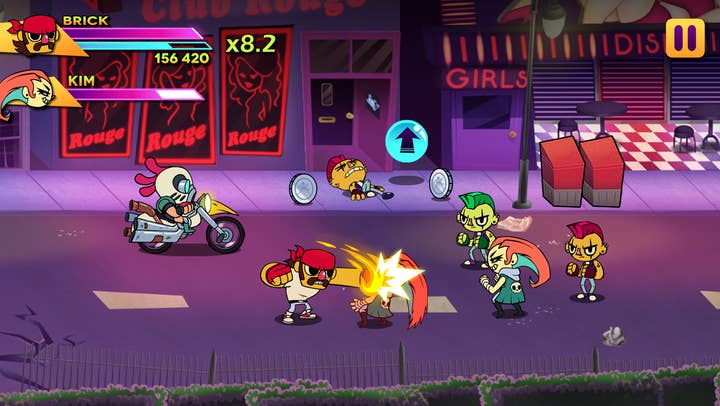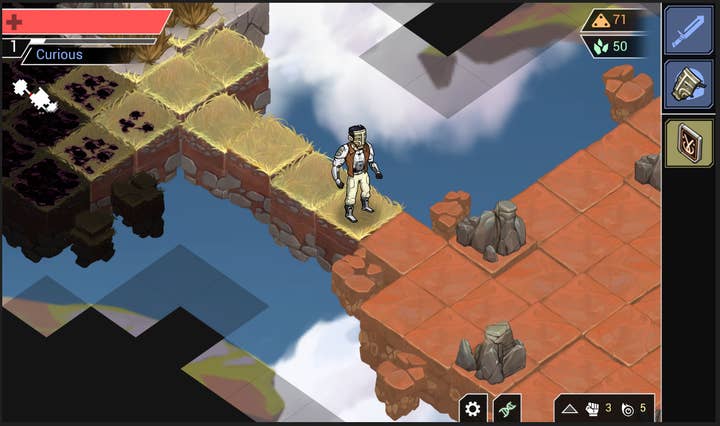When free-to-play isn't the best option
Kitfox and Double Stallion find more success with premium follow-ups to free-to-play failures
To hear the likes of Electronic Arts and Gameloft tell it, premium apps are all but a relic of the past, the obsolete progenitor to mobile's free-to-play future. But some smaller developers have found that future isn't all it's made out to be, and have been finding more success back on the premium side of the fence.
Kitfox Games and Double Stallion, two Montreal studios from Jason Della Rocca's Execution Labs incubator, launched Shattered Planet and Big Action Mega Fight, respectively, on mobile in the last year. However, both titles struggled to rake in revenue, and the studios have since released more successful premium versions of the two. Kitfox's Tanya X. Short and Double Stallion's Nicolas Barrière-Kucharski spoke with GamesIndustry International this week to discuss their forays into free-to-play, and why more traditional business models worked better for them.
In Double Stallion's case, part of the problem was that Big Action Mega Fight proved an awkward fit for the free-to-play format.
"We picked a genre, fighting, that was very content-driven," Barrière-Kucharski said. "It was really very arduous to keep up and engage the audience with new levels, new enemies, and new types of content. We couldn't compete at our size and budget with other, more established free-to-play studios and games."

Beyond that, the genre may have been a poor fit for the audience. Barrière-Kucharski said that the people who would appreciate Big Action Mega Fight's skill-based gameplay and faithful take on the beat-'em-up genre simply weren't the same people interested in free-to-play games.
"I think the overlap between audiences was just too small to sustain a thriving community around the game," Barrière-Kucharski said.
With Shattered Planet, Short said genre wasn't a problem. She thinks the games-as-a-service model is actually a perfect fit for roguelikes like Shattered Planet, where a few new items and systems can exponentially increase the potential content for players to experience. However, Shattered Planet still didn't fit the free-to-play mold for a few reasons.
"Free-to-play is not always suitable to single-player games," Short said. "I think it's best suited to multiplayer games in which it being free is actually of value to players because they can have more people to play with. That's one philosophy we've developed, that if we ever do free-to-play again, we would only do it for multiplayer."
"We made a difficult game, and the fact that it was free made people suspicious, and rightfully so."
Tanya X. Short
On top of that, Shattered Planet was designed to be a tough game for players. But Short said in the free-to-play business model, difficulty can be "a dangerous thing."
"We made a difficult game, and the fact that it was free made people suspicious, and rightfully so," Short said. "I think they had every right to be a little bit paranoid about why the game was difficult. And in a business model where difficulty generally does often make people spend more, I think a designer's hands are tied as to how and when a game can be difficult and when it's ethical. So we felt a lot more comfortable about making a premium game, and me as the designer, I was happier because we could say sincerely that it's exactly as difficult as we wanted it to be and you can't say it was greedy or whatever.
Both games have found more success since they were released as premium versions. Big Action Mega Fight was re-launched last month as a $3 app ($2 during a first-week sale); those who downloaded the free-to-play version received the upgrade to the premium version as a free title update. Even though the free version of the game was downloaded about 400,000 times, Barrière-Kucharski said the revenues from Big Action Mega Fight's first week as a paid app topped the total lifetime income from the free-to-play version since its November debut. To date the company has sold about 3,600 copies of Big Action Mega Fight on iOS, Android, Amazon Fire, and Ouya.
Kitfox took a different approach to premium the switch, continuing to run the free-to-play Shattered Planet mobile app alone, but also releasing a premium PC version on Steam with a $15 price tag and no monetization beyond that. The results were similarly positive, as Short said the studio made as much on Steam in one day as it had on mobile in two months. In its first week, Shattered Planet sold 2,500 copies on Steam. Short is happy to see the game bringing in more money, but she confessed to being a little bit torn on the trade-off it required.

"It really was great seeing that we had 300,000 downloads on mobile," Short said. "We had 300,000 people play Shattered Planet on iOS and Android, and that's amazing. Sure, it looks like we're going to make two to five to 10 times more money on Steam, but it's only going to be 1 percent of the amount of people that could see it if we tried to release it free, in theory... It's a little bit sad that you monetize better with fewer people. When you're trying to get your brand and your name out there, it is sad we couldn't have another few hundred thousand people."
Beyond the trade-off of settling for a smaller but more supportive audience, Kitfox has encountered some negative effects of releasing Shattered Planet as a free-to-play mobile title and then as a PC premium game.
"For us, a lot of people remained skeptical of the quality of the game if they knew the mobile version existed," Short said. "I don't think that really has that much to do with free-to-play and more to do with platform snobbery. It's just kind of a general feeling of console and PC gamers that if a game was ever on mobile, it couldn't possibly be as feature-rich or as deep, as strategic or anything like that."
"It's really hard to be found or be discovered by players. I'm really looking forward to all the curation issues that are going to be tackled in the next year or so on iOS 8 and the Steam Greenlight update."
Nicolas Barrière-Kucharski
On top of that, there was some customer confusion over the game and its business model. Short said the game's forums on Steam had some angry users saying they wouldn't buy the game because it had in-app purchases (which it didn't). Although the developers were able to post in the threads and clear things up, that sort of inconsistency has convinced them that if they ever do return to mobile platforms, they will stick to a free demo or companion app rather than something monetized.
"It's just so dominated by giant players," Short said of the mobile scene. "It's such a completely different market that I think you really have to focus on it, and that's not my team's expertise. For us, we're definitely going to be focus on PC and console; I think that's where our talents are."
Barrière-Kucharski agreed, saying that even if a niche audience is willing to pay for a certain experience, there just aren't good ways for developers to connect to that audience.
"It's really hard to be found or be discovered by players," Barrière-Kucharski said. "I'm really looking forward to all the curation issues that are going to be tackled in the next year or so on iOS 8 and the Steam Greenlight update."
But even if those initiatives follow through on their promises of improving discoverability, Barrière-Kucharski worries that the problem could still get worse as the gains made won't be enough to offset the flood of new developers entering the field. Short also saw discoverability as a key problem facing developers right now, but stressed that finding a solution is in the best interests of the platform holders.
"Whatever platform figures out discoverability first will have a huge advantage because there are these thousands of developers that as soon as they hear there is any discoverability, that's where they're going to flood for sure," Short said. "So it is almost a race at the moment between Steam and Apple and Google."

